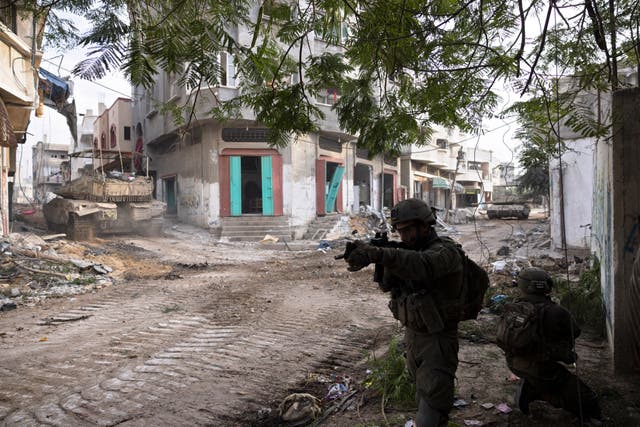
Shelagh Fogarty 1pm - 4pm
11 December 2023, 19:34

Israel has pledged to remove Hamas from power and destroy its military capability.
Israeli forces battled Palestinian militants in Gaza’s two largest cities on Monday, with civilians still sheltering along the front lines even after massive waves of displacement across the besieged territory.
Israel has pledged to keep fighting until it removes Hamas from power, dismantles its military capabilities and returns all of the scores of hostages still held by Palestinian militants after being captured during the October 7 surprise attack into Israel that ignited the war.
Israel’s defence minister on Monday pushed back against international calls to wrap up the country’s military offensive in the Gaza Strip, saying the current phase of the operation against the Hamas militant group will “take time”.

Yoav Gallant, a member of Israel’s three-man war cabinet, remained unswayed by a growing chorus of criticism over the widespread damage and heavy civilian death toll caused by the two-month military campaign.
The UN secretary-general and leading Arab states have called for an immediate ceasefire.
The US has provided unwavering diplomatic and military support for the campaign, even as it has urged Israel to minimise civilian casualties and further mass displacement.
The war has killed thousands of Palestinian civilians and driven nearly 85% of the territory’s 2.3 million people from their homes.
In an interview with The Associated Press, Mr Gallant refused to commit to any firm deadlines, but he signalled that the current phase, characterised by heavy ground fighting backed up by air power, could stretch on for weeks and that further military activity could continue for months.
“We are going to defend ourselves. I am fighting for Israel’s future,” he said.

Mr Gallant said the next phase would be lower-intensity fighting against “pockets of resistance” and would require Israeli troops to maintain their freedom of operation.
“That’s a sign the next phase has begun,” he said.
Residents said there was heavy fighting in and around the southern city of Khan Younis, where Israeli ground forces opened a new line of attack last week, and battles were still underway in parts of Gaza City and the built-up Jabaliya refugee camp in northern Gaza, where large areas have been reduced to rubble.
“The situation is extremely difficult,” said Hussein al-Sayyed, who is staying with relatives in Khan Younis after fleeing Gaza City earlier in the war. “I have children and I don’t know where to go. No place is safe.”
He and his three daughters are staying in a three-storey home with about 70 other people, most of whom have fled from the north, and said they have been rationing food for days.
“Over many days, I have eaten just one meal a day to save food for the girls. They are still young,” he said.

Another Khan Younis resident, Radwa Abu Frayeh, witnessed heavy Israeli strikes around the European Hospital, where the UN humanitarian office says tens of thousands of people have sought shelter.
She said a strike hit a home close to hers late on Sunday.
“The building shook,” she said. “We thought it was the end and we would die.”
With very little aid allowed in, Palestinians face severe shortages of food, water and other basic goods.

Some observers openly worry that Palestinians will be forced out of Gaza altogether in a repeat of the mass exodus from what is now Israel during the 1948 war surrounding its creation.
“Expect public order to completely break down soon, and an even worse situation could unfold including epidemic diseases and increased pressure for mass displacement into Egypt,” U.N. Secretary-General Antonio Guterres told a forum in Qatar, a key intermediary, on Sunday.
Eylon Levy, an Israeli government spokesman, called allegations that Israeli intends mass displacement from Gaza “outrageous and false”.
Israel has said it tries to avoid harming civilians and blames their deaths on Hamas, saying it endangers residents by fighting in dense areas and positioning military infrastructure – including weapons, tunnels and rocket launchers – in or near civilian buildings.

The military said on Sunday that troops killed armed men as they left a clinic, and that forces operating in Jabaliya found a truck full of long-range rockets near a school.
In a home in Jabaliya, soldiers found a rifle, two rocket-propelled grenade launchers and explosives, it said.
Israel has urged people to flee to what it says are safe areas in the south but has continued to strike alleged militant targets throughout the territory.
Associated Press reporters saw nine bodies brought to a local hospital on Monday after an airstrike hit a home in Rafah overnight.
With the war in its third month, the Palestinian death toll in Gaza has surpassed 17,900, the majority women and children, according to the health ministry in the Hamas-controlled territory.
The ministry does not differentiate between civilian and combatant deaths.
Some 1,200 people have been killed on the Israeli side, mostly civilians killed during the October 7 attack, in which Hamas and other militants also captured more than 240 people, including babies, women and older adults. More than 100 captives were released during a weeklong cease-fire late last month in exchanges for women and minors held in Israeli prisons.
Israel says Hamas still has 117 hostages and the remains of 20 people killed in captivity or during the October 7 attack.
Most remaining hostages are soldiers and civilian men, and the militants hope to exchange them for Palestinians imprisoned by Israel.
The military says 101 Israeli soldiers have died since the start of the Gaza ground offensive.